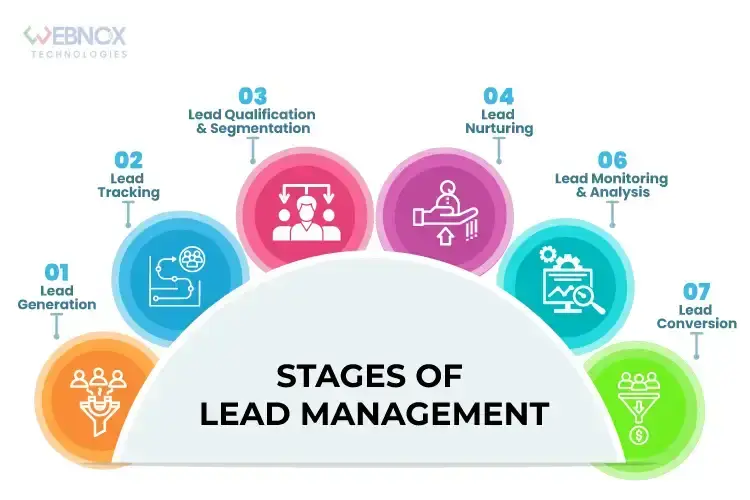How Lead Management Software Can Boost Your Business Efficiency and Sales?

Rathinakumar // 29-02-2024
Understanding Lead Management Software
Lead management software enables marketing and sales teams to handle leads across the sales funnel. It helps firms to improve their sales processes, boost conversion rates, and enhance revenue. Lead management system improves communication between marketing and sales teams, allowing for better collaboration and coordination in achieving revenue targets.
Importance of Lead Management Software
Lead management software for small businesses simplifies lead tracking and increases sales efficiency. It provides transparency on lead origins, provides insight into lead activity, and ensures no leads are duplicated or lost. Automated lead analysis reduces manual errors and ensures accurate data interpretation. Lead nurturing using simple methods is more effective and consistent, increasing the chances of converting leads into customers. Lead management helps sales teams overcome barriers, improve productivity, and achieve greater success with lead generation and conversion efforts.

Stages of Lead Management
1. Lead Generation
Lead generation is the process of attracting and capturing potential customers’ interest in a product or service. Here, you can generate leads and expand your customer base through marketing strategies such as content marketing, social media, email campaigns, and search engine optimization (SEO) to help generate a consistent stream for training and conversion as it continues
2. Lead Tracking
Lead tracking involves monitoring and recording engagement with leads across a company’s marketing and sales channels. Leadership tracking enables companies to gather valuable insights into leadership behaviors, preferences, and purchase intentions. By tracking leading-edge activities such as website visits, email opens, downloads, and social media interactions, businesses can identify potential opportunities, prioritize leads, and tailor marketing and sales policies as appropriate
3. Lead Qualification and Segmentation
Lead qualification and segmentation determine the quality of leads and readiness for sales segmentation. If your company uses criteria such as demographics, firmographics, engagement levels, and purchase intent to qualify and segment leads into groups or segments. By qualifying and categorizing leads, you can prioritize efforts, focus built on strong leadership, engage prospects effectively to produce and deliver personalized information and messages
4. Lead Nurturing
Lead nurturing is the process of building relationships with leads and guiding them through the buyer journey to make a purchase decision. Through targeted communication, personal connections, and valuable resources, you can nurture leaders, address your customer needs and concerns, and establish trust and confidence. Effective lead management strategies help your businesses drive leads, educate them about your products or services, and ultimately facilitate adaptation.
5. Lead Monitoring and Analysis
Leadership tracking and evaluation involves tracking and analyzing key performance metrics and indicators of leadership generation, engagement, and change. By monitoring metrics such as lead conversion rates, sales cycle length, conversion trends, and return on investment (ROI), you can measure the effectiveness of your lead management efforts, identify areas for improvement, and deliver good sales and marketing strategies to bring the best results for your business
6. Lead Conversion
Lead conversion is the ultimate goal of the lead management process, where leads are converted from prospects to paying customers. By implementing effective leadership training, sales engagement, and follow-up strategies, businesses can guide leads through the conversion funnel and encourage them to do the things they want, whether it’s purchasing, delivering, signing up for a service, or asking more questions they have. The successful lead conversion increases revenue, improves customer acquisition, and increases productivity.
Benefits of Having a Lead Management System
1. Automated & Centralized Lead Capture
A lead management system allows your organization to collect lead data through a variety of channels, including online forms, social media, and email marketing. It allows your business to automate the lead-collecting process, reduce manual errors, ensure data precision, and optimize time consumption. With all lead details consolidated in one platform, sales teams can efficiently access and prioritize leads, facilitating swift and tailored follow-ups for enhanced productivity and improved conversion rates.
2. Better Sales Forecasting
Using lead management software improves sales forecasting by delivering precise data insights. If your business has detailed information on lead behavior and conversion patterns, you can set realistic revenue targets and adapt your sales efforts accordingly. This offers a more targeted and effective approach to earning money, which helps your firm stay competitive and ahead of the market.
3. Boost Conversion Rates & Increase Sales
Lead management software is critical for improving conversion rates and increasing sales growth. Your business may nurture leads through the whole sales funnel by providing solutions for effective lead tracking, segmentation, and targeted engagement. Sales teams can increase conversion rates by delivering timely and relevant content to prospects through automated workflows and tailored conversations. This proactive approach to lead management ensures that no opportunity is missed, resulting in higher conversion rates and, eventually, increased sales income.
4. Integration with CRM
Lead management software works seamlessly with Customer Relationship Management (CRM) systems, allowing your firm to consolidate lead engagements. This integration gives sales teams a comprehensive perspective of customer interactions and preferences, allowing them to make informed decisions and personalize their approach more effectively. Businesses that record lead interactions within the CRM system can better nurture relationships and promote conversions.
5. Time and Cost Savings
Implementing a lead management system saves your business a substantial amount of time and money. The software’s efficiency and automation streamline lead collecting, nurturing, and conversion processes, reducing manual work and the chance of error. This not only saves sales teams significant time but also reduces the costs associated with human labor and resource allocation. You can get a competitive advantage by using lead management software to maximize productivity and optimize resource use for your business.
6. Increase ROI by Nurturing
Lead management software improves your organization’s return on investment (ROI) through effective lead nurturing. If your business collects accurate data on lead behavior and preferences can tailor your care efforts to specific needs and pain points. So, you can use automated lead nurturing campaigns to get prospects to use targeted content at the right time, guide them through the customer’s journey, and drive conversions This targeted approach not only increases the chances of a sale but also ensures efficient use of resources as a result maximizing potential ROI
Selection of Lead Management Software
When choosing the best lead management software company, you need to consider several factors based on some specific needs. Testing scalability, user-friendliness, and integration capabilities are essential to ensure ease of use and long-term viability. Additionally, evaluating features such as lead tracking, automation, and reporting functionality can help align the software with business objectives. And, you should also prioritize solutions that offer strong customer support, safeguard security, and customization processes to tailor software to your specific needs. By carefully considering these factors, you can choose the ideal lead management software to optimize your sales process.
Conclusion
In the end, lead management software helps your business to keep organized and allows you to track potential customers, or leads, in one convenient place. It makes it easier to know where leads come from, how they interact with your business, and which ones are most likely to become paying customers.
With this software, you can automate many tasks, like sending emails and reminders, so you don’t have to do everything manually. It saves time and reduces mistakes that can happen when managing leads by hand.
By using lead management software, your business can focus on the most promising leads, nurture them with helpful information, and turn them into loyal customers. Take the next step towards sales excellence and implement this powerful tool now!




